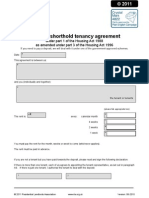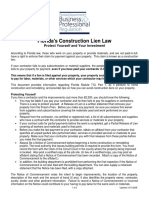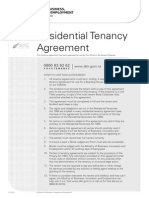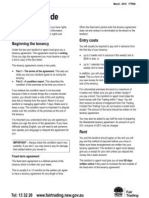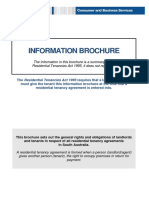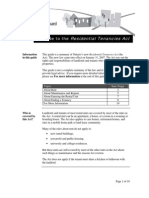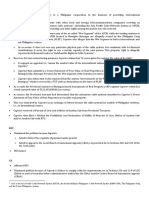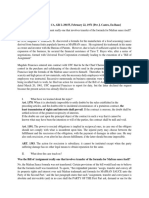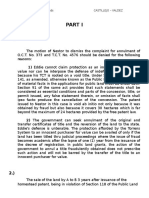Asking To Make An Alteration
Asking To Make An Alteration
Uploaded by
Anonymous JkCqFR5Copyright:
Available Formats
Asking To Make An Alteration
Asking To Make An Alteration
Uploaded by
Anonymous JkCqFR5Original Description:
Original Title
Copyright
Available Formats
Share this document
Did you find this document useful?
Is this content inappropriate?
Copyright:
Available Formats
Asking To Make An Alteration
Asking To Make An Alteration
Uploaded by
Anonymous JkCqFR5Copyright:
Available Formats
February 2014
Asking to make an alteration
Information for tenants
From time to time, you may wish to add to the comfort or
security of your home by making minor changes at your
own expense. It is important that you follow the proper
process otherwise action can be taken against you for
breaching the terms of your lease.
long as you notify your landlord or your agent of any
damage this causes.
Consent
If your landlord pays for the fixture in some way, then you
are not allowed to remove it without their consent. Your
landlord has the right to apply to the Tribunal for an order
that prohibits you from removing a fixture, or an order
that you pay for repairs to any damage you have caused
in removing a fixture.
You must first seek the landlords written consent before
you add a fixture or make any renovation, alteration or
addition to the premises. If an agent is managing the
property you can put your request to them. It is best to
put it in writing so you have a record of your request.
When submitting your request, you should try to provide
as much information as you can about the change you
wish to make to the property. For example, if you wish to
install pay television, you should first find out exactly
what is required to be done to the property. A landlord
may also be more likely to agree to your request if you
use a qualified tradesperson to carry out alterations.
Agreement is essential
You must then either pay for the cost of repairs, or
arrange to repair any damage to a satisfactory standard.
If you do not remove a fixture you have added by the
time you hand back possession, you cannot come back
and get it later on. It ceases to belong to you and forms
part of the premises.
When can a landlord refuse my
request?
Your landlord cannot unreasonably refuse to give you
consent to add a fixture or to make a change that is of a
minor nature.
Before you make any changes, you should agree with
your landlord as to who will pay the costs and what will
happen to any fixture you add at the end of the tenancy.
Make sure this is recorded in writing.
The law gives some guidance as to the types of reasons
where it would be reasonable for your landlord to say no
to your request.
Rules on costs
These include work which:
Generally, an added fixture or change made by you is at
your own expense unless your landlord offers to pay. For
example, your landlord may offer to share or cover the
cost of materials or reduce some rent. It is entirely up to
the agreement between you and your landlord. You are
not able to go to the NSW Civil and Administrative
Tribunal seeking to get back money for improvements so
make sure that this is agreed upon well in advance.
involves structural changes (e.g. knocking out a wall)
is not reasonably capable of being rectified, repaired
or removed
is not consistent with the nature of the property (e.g.
installing modern fixtures in a heritage property)
is prohibited under a law (such as a strata bylaw).
Removal at the end of the tenancy
If you pay for any fixtures in the premises, you are
allowed to remove them at the end of the tenancy, as
This is not an exhaustive list. There may be other
reasons to decline your request. If you think that the
reason for your landlords refusal is not reasonable, you
can apply to the Tribunal for permission to make the
change.
February 2014
Minor alterations
While a landlord cannot unreasonably refuse a change of
minor nature, the law does not define what a change of a
`minor nature is. This will depend on the property and
the circumstances. It is for you and your landlord to
agree on or for the Tribunal to resolve if a dispute arises.
If internal wiring is required then you may need to
organise a separate licensed cabler because the NBN
installer will not undertake internal wiring tasks and
permanent cabling through walls, floor or ceiling cavities.
The Australian Communications and Media Authority
(ACMA) can provide information on where to find
registered cablers.
Examples of the types of changes that may be
considered reasonable include:
Visit the NBN Co website for more information about
connecting to the NBN.
installing window safety devices for small children
installing additional security features
having a phone line connected
putting a reasonable number of picture hooks in the
wall
planting some vegetables or flowers in the garden
connecting to pay television
replacing the toilet seat
installing a grab rail in the shower for elderly or
disabled occupants.
Painting the premises
It is up to the landlord to decide whether you can paint
the premises (inside or out) and the Tribunal cannot give
permission if the landlord refuses. If the landlord does
consent, you should make sure they are aware of the
colour, type and brand of paint and how many coats you
are planning to do before you begin, to avoid any
disagreements later on. Make sure these details are
included in the landlord's written consent.
Remedies for unsatisfactory work
Your landlord can apply to the Tribunal for order against
you for the cost of rectifying work you have done or
arranged if:
they can show the work was not done to a
satisfactory standard or
it is likely to adversely affect the landlords ability to
rent the premises in the future to other tenants.
Such an application can be made whether or not your
landlord gave you consent to add the fixture or to make
the change.
Installing the National Broadband
Network
As with other types of alterations, if you would like to
access the NBN you must first seek the landlords written
consent. You may have to pay any costs associated with
the installation of this service, but you can negotiate with
your landlord and they might agree to pay for some or all
of the costs.
www.fairtrading.nsw.gov.au
Fair Trading enquiries 13 32 20
TTY 1300 723 404
Language assistance 13 14 50
This fact sheet must not be relied on as
legal advice. For more information about
this topic, refer to the appropriate
legislation.
State of New South Wales through NSW Fair Trading
You may freely copy, distribute, display or download this information with some important
restrictions. See NSW Fair Trading's copyright policy at www.fairtrading.nsw.gov.au or email
publications@services.nsw.gov.au
You might also like
- Vehicle Sale LetterDocument5 pagesVehicle Sale LetterRadhey Paliwal75% (84)
- Tenancy Agreement RLA ASTDocument4 pagesTenancy Agreement RLA ASTDavid Dsd Nguyen100% (1)
- Home Owner S JCT ContractDocument17 pagesHome Owner S JCT Contractmjdscribe0% (1)
- Tenancyagreement BlankDocument5 pagesTenancyagreement BlankPeter HuddNo ratings yet
- Home Owner Building Contract No Consultant AppointedDocument17 pagesHome Owner Building Contract No Consultant AppointedmustafaNo ratings yet
- Florida's Construction Lien Law: Protect Yourself and Your InvestmentDocument2 pagesFlorida's Construction Lien Law: Protect Yourself and Your InvestmentpeterNo ratings yet
- Renter's Rights - Office of The Attorney GeneralDocument5 pagesRenter's Rights - Office of The Attorney GeneralinsidiousevilexposedNo ratings yet
- BCL006 Explanation of Contract (Community)Document5 pagesBCL006 Explanation of Contract (Community)Conveyancers DirectoryNo ratings yet
- Residential Tenancy AgreementDocument4 pagesResidential Tenancy AgreementDaniel WhiteNo ratings yet
- Rental Law ChangesDocument2 pagesRental Law ChangesRenukha PerezNo ratings yet
- New Tenant ChecklistDocument2 pagesNew Tenant ChecklistWing ChuNo ratings yet
- 464261repair LetterDocument16 pages464261repair LetterSeerat BlouchNo ratings yet
- Q&ADocument41 pagesQ&AConor DonnellanNo ratings yet
- QLD HandbookDocument5 pagesQLD Handbookmandy.cheung02No ratings yet
- Andlord Enant AW: Olding EpositsDocument5 pagesAndlord Enant AW: Olding EpositsRoldan LualhatiNo ratings yet
- 14B The Foundry 1 Loughborough Service Charge Demand Notice in Advance For 3 093.87 20-12-2023Document2 pages14B The Foundry 1 Loughborough Service Charge Demand Notice in Advance For 3 093.87 20-12-2023susandavid47No ratings yet
- Home Improvement Business Exam GuideDocument10 pagesHome Improvement Business Exam GuideAl PenaNo ratings yet
- Utility Shutoff Guide - 0Document4 pagesUtility Shutoff Guide - 0Jonathan HeynekeNo ratings yet
- Local Lettings and Estates LTDDocument6 pagesLocal Lettings and Estates LTDlocallettingsNo ratings yet
- Living in SwitzerlandDocument28 pagesLiving in SwitzerlandbioNo ratings yet
- CAV Renters GuideDocument6 pagesCAV Renters GuideClarkBarcelonNo ratings yet
- Renting A Home A Guide For Tenants New LegislationDocument6 pagesRenting A Home A Guide For Tenants New LegislationClarkBarcelonNo ratings yet
- How To Evict Tenant in Malaysia in 4 Steps - Iproperty - Com.myDocument1 pageHow To Evict Tenant in Malaysia in 4 Steps - Iproperty - Com.myhaffidz AriffinNo ratings yet
- Share Housing: Tenants Rights Factsheet 15Document2 pagesShare Housing: Tenants Rights Factsheet 15Danny AthertonNo ratings yet
- Your Rights As A Tenant: Rhode Island Legal Services, IncDocument8 pagesYour Rights As A Tenant: Rhode Island Legal Services, IncjdelsNo ratings yet
- CAV Renters GuideDocument6 pagesCAV Renters GuideClarkBarcelonNo ratings yet
- Renting Guide: Beginning The Tenancy Entry CostsDocument4 pagesRenting Guide: Beginning The Tenancy Entry CostsRebecca DooleyNo ratings yet
- Amity Law School Land Law Project Tenancy Reform: Submitted by Adeeba Faheem Oshin Suryawanshi TamannaDocument9 pagesAmity Law School Land Law Project Tenancy Reform: Submitted by Adeeba Faheem Oshin Suryawanshi Tamannaprithvi yadavNo ratings yet
- Lease SheetDocument46 pagesLease SheetAnonymous tyEGT2RJJUNo ratings yet
- Contract FactsheetDocument2 pagesContract Factsheetapi-267713503No ratings yet
- Lect 3 Tenancy AgreementDocument25 pagesLect 3 Tenancy AgreementNanaNo ratings yet
- Renting and YouDocument19 pagesRenting and Yougeetanjalis_4No ratings yet
- Lease Agreement: Fir Village IncDocument5 pagesLease Agreement: Fir Village Incasdf asdfNo ratings yet
- 08 What Do I Need To Know Before Moving Out STUHDocument2 pages08 What Do I Need To Know Before Moving Out STUHSon T. NguyenNo ratings yet
- Contracts For Building ProjectsDocument13 pagesContracts For Building ProjectsRyanCallejaNo ratings yet
- Information BrochureDocument11 pagesInformation BrochureJames GeorgeNo ratings yet
- New Microsoft Word DocumentDocument25 pagesNew Microsoft Word Documentanon-986735No ratings yet
- 2324 Re Level5 U01 Ce01 Sut A Template LetterDocument4 pages2324 Re Level5 U01 Ce01 Sut A Template LetterJade AtwellNo ratings yet
- Landlord Rental Increase LetterDocument2 pagesLandlord Rental Increase LetterNellie LennieNo ratings yet
- A Letter of Intent (Loi) & Quantum Meruit: Hosam ElkmhawyDocument13 pagesA Letter of Intent (Loi) & Quantum Meruit: Hosam ElkmhawySalah El FezzaniNo ratings yet
- FAQ's Landlord TenantDocument9 pagesFAQ's Landlord Tenantgrahneg100% (1)
- Fact Sheets On House Rules and RegulationsDocument3 pagesFact Sheets On House Rules and RegulationsEllen OpleNo ratings yet
- httpswww.tenancydepositscheme.comwp-contentuploads202303How-to-present-your-case-to-a-TDSadjudicator.pdfDocument17 pageshttpswww.tenancydepositscheme.comwp-contentuploads202303How-to-present-your-case-to-a-TDSadjudicator.pdflara hijaziNo ratings yet
- CPPREP4124 - Notice To Vacate - VIC.v1.2Document11 pagesCPPREP4124 - Notice To Vacate - VIC.v1.2ad78il1No ratings yet
- A Guide To The: Residential Tenancies ActDocument10 pagesA Guide To The: Residential Tenancies Acts.chabot4130No ratings yet
- Home Sweet Home... ImprovementDocument16 pagesHome Sweet Home... Improvementscribder2000No ratings yet
- California Eviction NoticeDocument6 pagesCalifornia Eviction NoticeRocketLawyer100% (1)
- Renovation ContractsDocument5 pagesRenovation ContractsMohd Nor UzairNo ratings yet
- Your Complete Property Renting GuideDocument10 pagesYour Complete Property Renting Guidebok kopNo ratings yet
- Apply For Us To Adopt Your New SewerDocument9 pagesApply For Us To Adopt Your New SewerDastin AdamowskiNo ratings yet
- Reply To Demand LetterDocument2 pagesReply To Demand Letterf cardNo ratings yet
- Photovoltaic (Solar) Installation AgreementDocument6 pagesPhotovoltaic (Solar) Installation AgreementQueNo ratings yet
- 6297d32d38300c45efd3b912 - Housing Contract Guide - WEB - z9fx3VetQrm3Fc3fpTlsDocument8 pages6297d32d38300c45efd3b912 - Housing Contract Guide - WEB - z9fx3VetQrm3Fc3fpTlsPKUMARNo ratings yet
- Guide To Tenants: Once Your Offer On A Property Is Agreed, Our Fees Upon Your ApplicationDocument29 pagesGuide To Tenants: Once Your Offer On A Property Is Agreed, Our Fees Upon Your ApplicationAlex DraghiciNo ratings yet
- Energy SupplyDocument9 pagesEnergy SupplykernowmountNo ratings yet
- GG Tenancy GuideDocument7 pagesGG Tenancy GuideGareth McKnightNo ratings yet
- Writing All About RentDocument3 pagesWriting All About RentMiNo ratings yet
- BLDG Ass7Document3 pagesBLDG Ass7Mark Velasco TomasNo ratings yet
- LEASESDocument12 pagesLEASESmengele330No ratings yet
- Eviction Process in Oklahoma - When To Serve Eviction?Document18 pagesEviction Process in Oklahoma - When To Serve Eviction?Anu SubediNo ratings yet
- LTD Assignment 1Document213 pagesLTD Assignment 1Jessica Joyce PenalosaNo ratings yet
- Capitol Wireless v. Provl Treasurer of BatangasDocument11 pagesCapitol Wireless v. Provl Treasurer of BatangasMassabielleNo ratings yet
- Romeo and Juliet Word SearchDocument1 pageRomeo and Juliet Word SearchVishakha HereNo ratings yet
- Intel McAfee 1-MainDocument19 pagesIntel McAfee 1-MainJordan NovetNo ratings yet
- Partnership at WillDocument11 pagesPartnership at WillmyaccountofScribd100% (3)
- Land Sale Agreement.Document2 pagesLand Sale Agreement.kyaka herman ceaserNo ratings yet
- Spa MortgageDocument4 pagesSpa MortgageRaysun0% (1)
- Certificate of Environmental Clearance FeesDocument2 pagesCertificate of Environmental Clearance FeesJayvee ColiaoNo ratings yet
- Universal Food Corp. v. CADocument2 pagesUniversal Food Corp. v. CAAiress Canoy CasimeroNo ratings yet
- Francisco vs. Boiser (Notification of Legal Redemption)Document9 pagesFrancisco vs. Boiser (Notification of Legal Redemption)AlexPamintuanAbitanNo ratings yet
- US v. Carroll TowingDocument2 pagesUS v. Carroll Towingjjleague7507No ratings yet
- John David Boggs v. William Merideth: ComplaintDocument11 pagesJohn David Boggs v. William Merideth: ComplaintFindLawNo ratings yet
- Gifts Wills and Trusts OutlineDocument93 pagesGifts Wills and Trusts OutlineSureshNo ratings yet
- DBP V OngDocument1 pageDBP V OngAices SalvadorNo ratings yet
- Quiz #10 - RăspunsuriDocument6 pagesQuiz #10 - RăspunsuriRalph John Alipio ValdezNo ratings yet
- Spec Pro Cases - Batch 3Document275 pagesSpec Pro Cases - Batch 3Azrael CassielNo ratings yet
- Girth Gear Work OrderDocument3 pagesGirth Gear Work OrderDgk RajuNo ratings yet
- Law of Tort: NuisanceDocument40 pagesLaw of Tort: Nuisancegayathiremathibalan100% (2)
- Tabla PerfilDocument2 pagesTabla PerfiltierylabordeNo ratings yet
- PCIB vs. Court of Appeals, G.R. No. 84526, January 28, 1991Document5 pagesPCIB vs. Court of Appeals, G.R. No. 84526, January 28, 1991Xtine CampuPotNo ratings yet
- Deed of Sale: TRANSFER OF CERTIFICATE of TITLE No. 053-2015002185 LOT 29Document2 pagesDeed of Sale: TRANSFER OF CERTIFICATE of TITLE No. 053-2015002185 LOT 29Celine GarciaNo ratings yet
- Sample Lease Agreement Form Between State and CompanyDocument5 pagesSample Lease Agreement Form Between State and CompanyDave Fletcher50% (2)
- Legal SeparationDocument12 pagesLegal SeparationkhinierNo ratings yet
- Rule 3 Civil ProcedureDocument8 pagesRule 3 Civil Procedurececil fabroNo ratings yet
- Fault Code List: Citea MTSDocument7 pagesFault Code List: Citea MTSElmin SkuljNo ratings yet
- Sub-Contractor Agreement With AcknowledgmentDocument3 pagesSub-Contractor Agreement With AcknowledgmentAlfred Edison Cimafranca TanNo ratings yet
- Abangan Vs AbanganDocument2 pagesAbangan Vs AbanganchrisbuenosNo ratings yet
- 179990Document24 pages179990The Supreme Court Public Information OfficeNo ratings yet
- Taxation Comprehensive Exam TosDocument2 pagesTaxation Comprehensive Exam Tosaccounting probNo ratings yet

